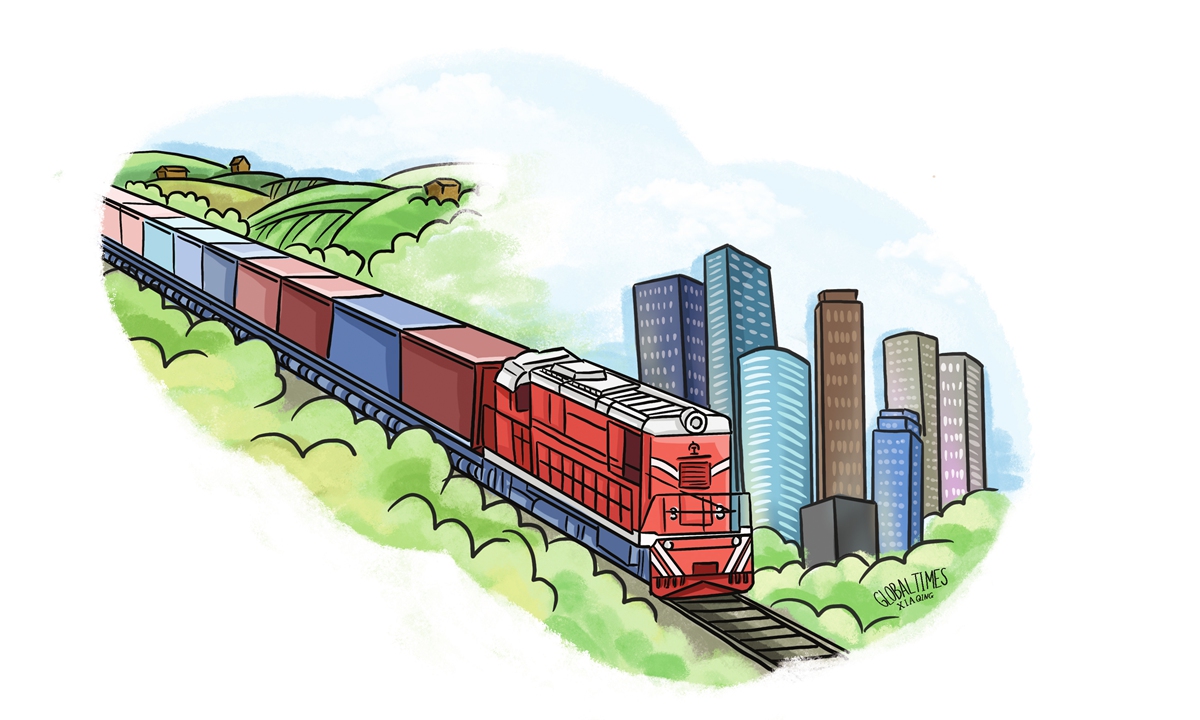Yunnan farmers escape poverty by selling coffee beans to Europe

Illustration: Xia Qing/GT
In June last year, a cargo train departed from Pu'er City in Yunnan Province via Xinjiang land port and headed for Europe. The train carried 12 containers of 307 tons of raw coffee beans, making it the first train of coffee beans sent from Pu'er to Europe via land.Pu'er City has a coffee planting area of more than 700,000 mu (467 km²) and an annual output of about 55,000 tons of coffee beans, accounting for more than half of the country's coffee planting area and production.
Some of the coffee I tasted in Menglian county, Yunnan Province, was exported to Europe by train. With its fine quality, Menglian's coffee will surely surprise European coffee consumers with its flavors.
As I wrote in previous articles, many coffee farmers have come out of the quagmire of poverty only in the last few years. In fact, they were still on the edge of the mire with one leg while the other was entering the tide of globalization.
This is due to China's precise poverty eradication program and even more so to China's growing openness. Pu'er was among the first region in China to open up, and the French opened the gateway to Yunnan from 1883 to 1885 with the Sino-French War. The subsequent opening allowed the French colonists to plunder a large number of mineral resources.
The coffee plantation in Menglian is just one small step in the fight against poverty in rural China; a larger symphony of China's agricultural modernization is made up of more such beautiful interludes.
As I traveled through the mountains of Yunnan, I read two stories about how durian grown on Hainan Island will be available this June, marking the first time China has produced durian. The other was that a company in Shandong had bred Atlantic salmon in the deep sea and started marketing it in batches. The average weight of a single fish reaches more than 7 kg.
In recent years, China's agriculture, forestry, and fisheries have been industrialized at an unprecedented speed, aided by modern technology, and have become part of the basic building blocks of a resilient economic system.
In the mountainous regions of southwestern Yunnan, it is impossible to understand what escaping poverty means to local farmers if you only know their incomes. Their incomes are still relatively low, at the bottom of China's scale. In 2022, rural residents' per capita disposable income in Pu'er was only 14,619 yuan ($2,058) or an average of just over a thousand RMB per month. But the resources they have, and their ability to protect and utilize those resources, are not what they used to be. Therefore, it is to be expected that a great embrace of Chinese agriculture, with modern development, will rapidly emerge.
Villagers in the mountain villages along China's southwestern border, who have been poor for many generations, are now transformed from the "end of openness" to the "front of openness" once they get on the modernization train.
In Ximeng county, which borders Myanmar, a border industrial park and port are under construction to provide a channel and platform for the people on both sides of the China-Myanmar border to realize trade exchanges as soon as possible. According to a local official, the completion of the project will revitalize and release the consumer dividend of the nearly 400,000 people in the two areas, creating an open and interconnected market.
Just look at the hot scenes of those border crossings opened in Guangxi and Yunnan in the early years. After completing the new hubs, it is easy to imagine what kind of development opportunities will be brought to the people of the two places.
There are many perspectives to observe China's economy, and what people tend to see most quickly is the vast consumer market and production system. But the potential of China's economy can also be felt in the sudden changes in the farming lives of these ordinary people at the grassroots level and at the rapid pace at which they enter the domestic and international cycle.
Their lifting out of poverty is the fruit of reform and opening and the impetus for further reform and opening up.
The French may experience a familiar taste when they taste coffee from Yunnan. They will be surprised that this coffee, cultivated from the seeds their forefathers brought to China back then, can be so mellow and fragrant.
Will they ask the question: Why did these coffee seeds germinate and bear fruit again after a century?
The coffee beans may not have changed, but the technology of cultivation, roasting, and transportation has changed, and most importantly, the people who grow coffee have changed.
Yes, every corner of China, the whole world, is changing rapidly, and if you do not appreciate this change, how can you accurately grasp the rhythm of China's economic pulse?
The author is a senior editor with People's Daily, and currently a senior fellow with the Chongyang Institute for Financial Studies at Renmin University of China. dinggang@globaltimes.com.cn. Follow him on Twitter @dinggangchina



